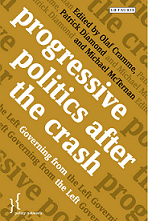Cramme, O., Diamond, P. and McTernan, M. eds., (2013), Progressive Politics After the Crash: Governing from the Left, London: I.B. Tauris & Co Ltd. Those who hoped the collapse of financial markets would usher in the end of neoliberalism and rehabilitate support for traditional social democratic policies programmes have been disappointed. It is not only the irrationality of markets which is the focus of public discontent, but the inefficiency of …Read More
Credit rating agencies and the Eurozone Crisis: What is the value of sovereign ratings?
Gaillard, N., (2013), “Credit rating agencies and the Eurozone Crisis: What is the value of sovereign ratings?”, www.voxeu.org, 9 Σεπτεμβρίου. Credit rating agencies didn’t anticipate the Eurozone Crisis and their ratings have been procyclical ever since. This column discusses research on the agencies’ recent performance. Since 2009, credit ratings have persistently lagged behind market spreads, suggesting that ratings have been more lenient with respect to Eurozone countries than generally believed. …Read More
Sovereign default risk and banks in Europe’s monetary union
Uhlig, Η., (2013), “Sovereign default risk and banks in Europe’s monetary union”, www.voxeu.org, 5 Σεπτεμβρίου. EZ banks are more exposed to their own nation’s government bonds than ever. This column argues that Eurozone members can now afford to tell their banks to diversify, but pressure from Germany, Austria, France and the ECB might be necessary. Defusing the pernicious entanglement between the Eurozone’s weak banks and weak sovereigns would reduce the …Read More
Low for how long? Estimating the ECB’s “Extended Period of Time”
Bletzinger, Τ., Wieland, V., (2013), “Low for how long? Estimating the ECB’s “Extended Period of Time”, www.voxeu.com, 5 Σεπτεμβρίου. The ECB has promised to keep interest rates low for an “extended period of time”. In a broad hint to the profession, President Draghi stressed a reasonable forecast of this period could be extracted from a monetary policy reaction function. This column presents one such forecast based on published macro forecasts …Read More
The Birth of Fiscal Unions
James, H., Siegel, J., (2013), “The Birth of Fiscal Unions”, www.project-syndicate.org, 5 September. Fiscal unification is often an effective way to enhance creditworthiness, and it may also create a new sense of solidarity among diverse peoples living within a large geographic area. For this reason, Europeans have often looked toward the model of the United States. But they have never been able to emulate it, because their motivations for union …Read More
The Global Competitiveness Report
World Economic Forum, (2013), “The Global Competitiveness Report”, 4 Σεπτεμβρίου. Excellent innovation and strong institutional environments are increasingly influencing economies’ competitiveness, according to The Global Competitiveness Report 2013-2014, which is launched today. The report’s Global Competitiveness Index (GCI) places Switzerland at the top of the ranking for the fifth year running. Singapore and Finland remain in second and third positions respectively. Germany moves up two places (4th) and the United States …Read More
The euro area’s tightrope walk: debt and competitiveness in Italy and Spain
Darvas, Z., (2013), “The euro area’s tightrope walk: debt and competitiveness in Italy and Spain”, www.bruegel.org, 3 Σεπτεμβρίου. Competitiveness adjustment in struggling southern euro-area members requires persistently lower inflation than in major trading partners, but low inflation worsens public debt sustainability. When average euro-area inflation undershoots the two percent target, the conflict between intra-euro relative price adjustment and debt sustainability is more severe.
Interim Economic Assessment
OECD, (2013), “Interim Economic Assessment”, 3 Σεπτεμβρίου. A moderate recovery is underway in the major advanced economies, according to the OECD’s latest Interim Economic Assessment. Growth is proceeding at encouraging rates in North America, Japan and the UK. The euro area as a whole is out of recession, although output remains weak in a number of countries.
The impact of the economic crisis on EU labour markets: A comparative perspective
Tridico, P., (2013), “The impact of the economic crisis on EU labour markets: A comparative perspective”, International Labour Review, Vol. 152, N.2, pp. 175-190. Using a “crisis management index” to rank the combined GDP and labour market performances of the EU’s 27 Member States, the author considers why some countries performed better than others in managing the economic crisis over the period 2007–11. Based on empirical correlations and regression analysis, …Read More
Heterogeneous transmission mechanism: monetary policy and financial fragility in the Eurozone
Ciccarelli, M., Maddaloni, Ang., Peydró, J-L., (2013), “Heterogeneous transmission mechanism: monetary policy and financial fragility in the Eurozone”, Economic Policy, Vol. 28, Issue 75, pp. 459-512. The eurozone economic activity and banking sector have shown substantial fragility over the last years with remarkable country heterogeneity. Using detailed data on lending conditions and standards, we analyse – along several key dimensions of heterogeneity – how financial fragility has affected the transmission …Read More





